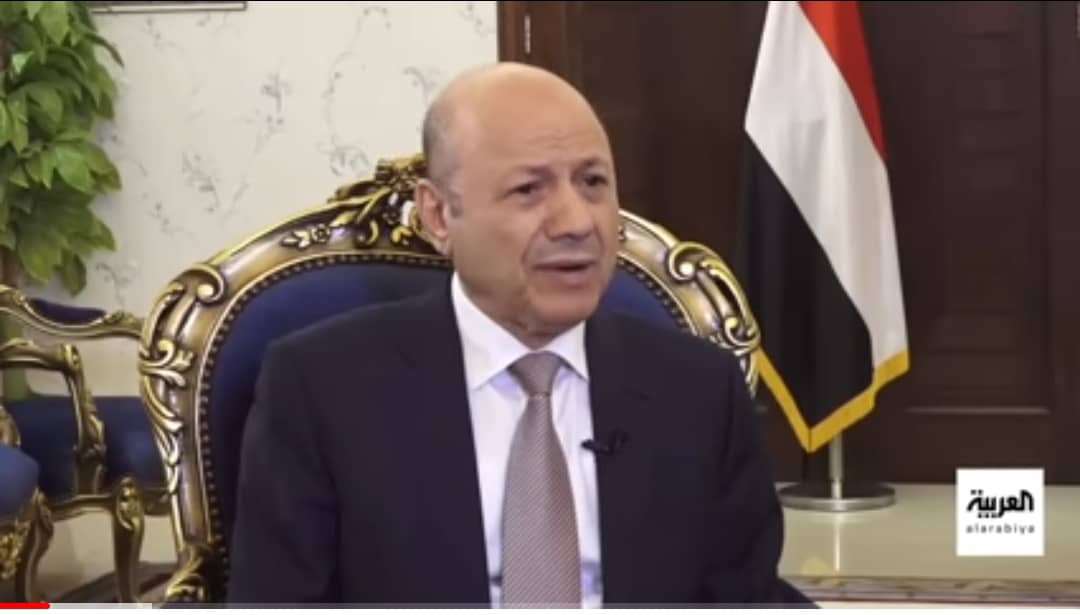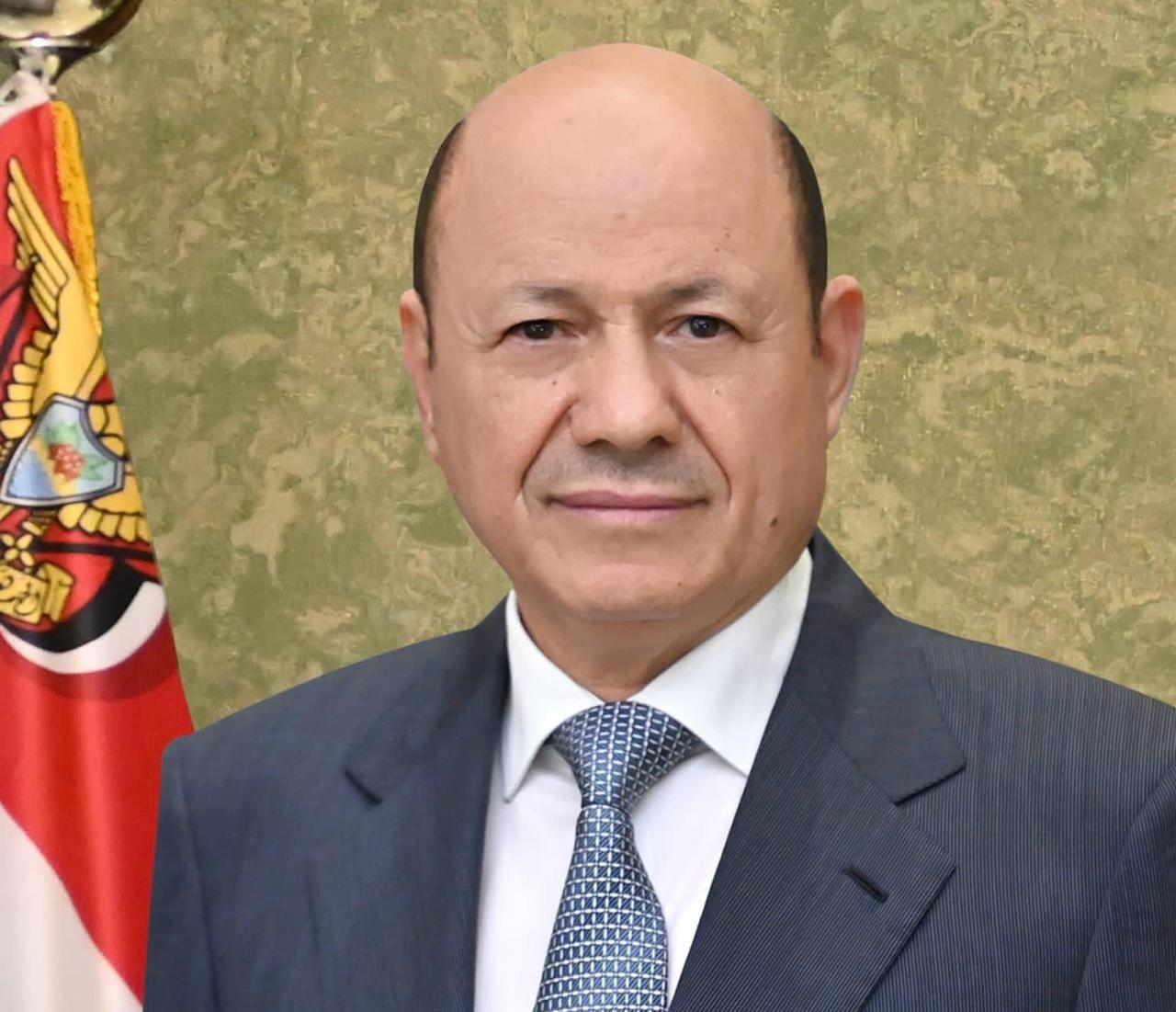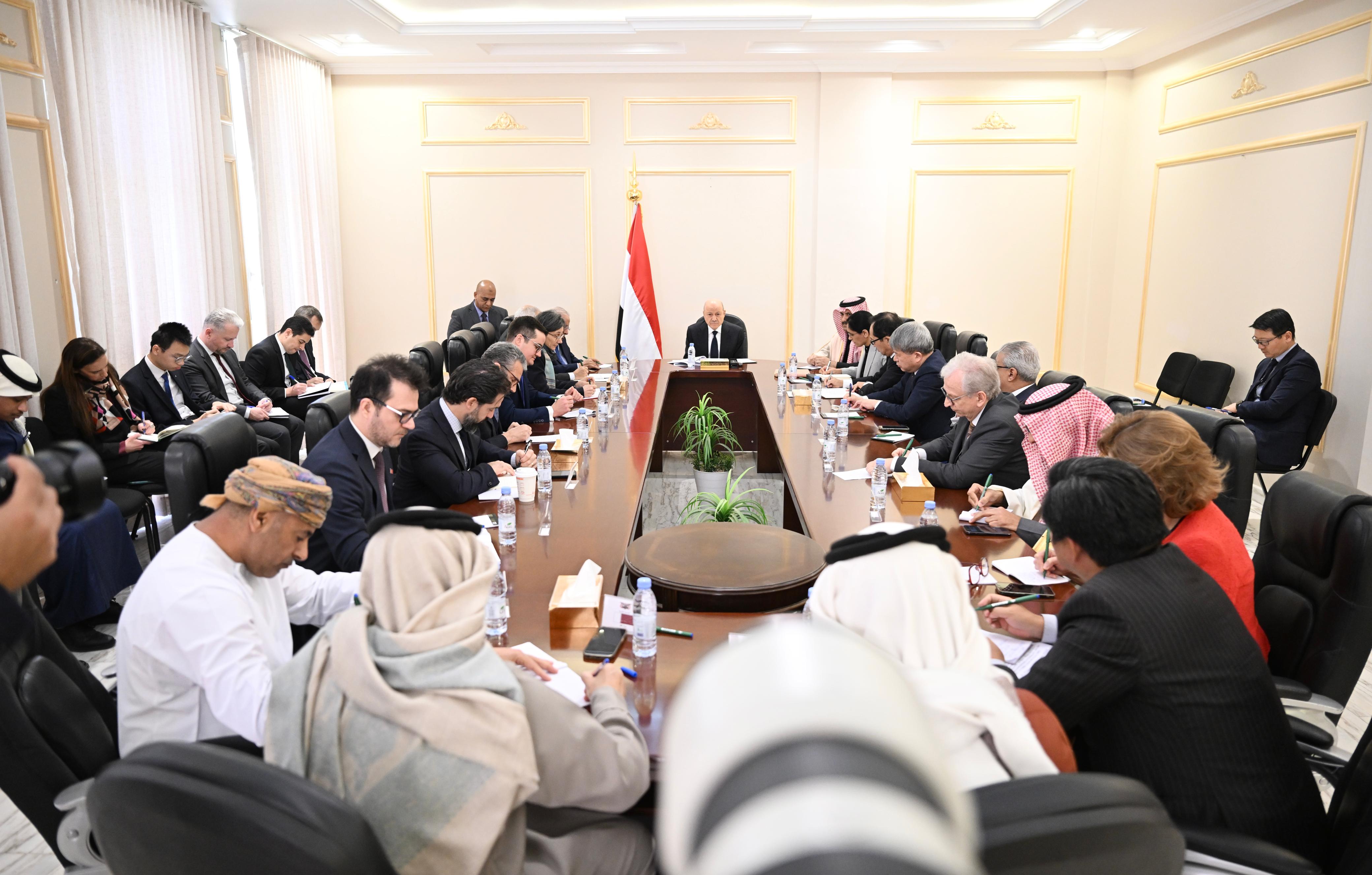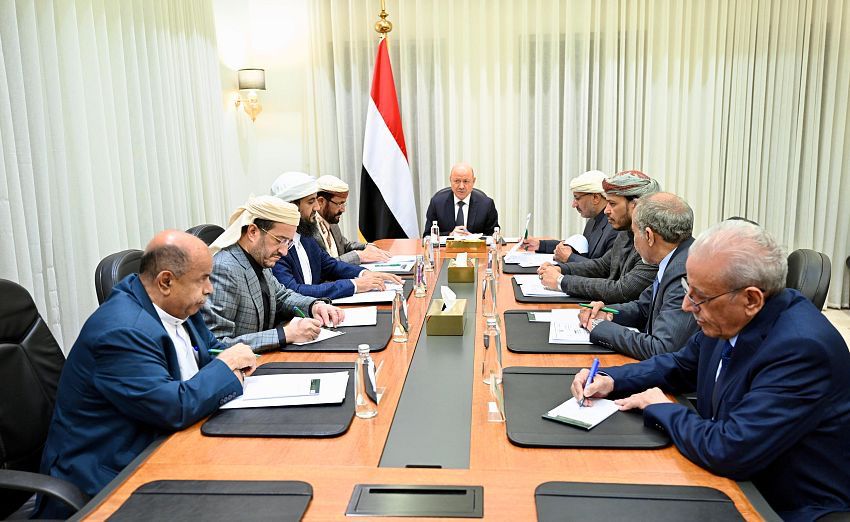
An Exclusive Interview with President Al-Alimi on Al Arabiya TV
Riyadh
Al-Arabiya and Al-Hadath TVchannels conducted an exclusive interview with His Excellency Dr. Rashad Mohammed Al-Alimi, President of the Presidential Leadership Council, the following is the full text of the interview.
The interviewer:
Good evening dear viewers. We have an exclusive interview with Dr. Rashad Al-Alimi, President of the Presidential Leadership Council, to shed light on the Saudi support for Yemeni people and the efforts made by Riyadh to stop the war and achieve peace. Welcome, Mr. President.
President Al- Alimi:
Welcome,
The interviewer:
A package of projects are opened and launched by the Saudi Development and Reconstruction Program for Yemen (SDRPY) in Aden amid the ongoing political efforts by Riyadh to stop the war and achieve peace. What are the implications of such timing and the importance of such projects at this point of time?
President Al- Alimi:
First of all, welcome Al Arabiya. We always look forward to being interviewed by Al Arabiya, and thank you for all your efforts in supporting the Presidential Leadership Council, the government and people of Yemen.
Regarding the subject of the projects being launched nowadays, obviously there are many implications for launching and opening such projects. First of all, you know that The Saudi Development and Reconstruction Program for Yemen (SDRPY) was established in 2018, so obviously when this program began, there were many challenges and difficulties facing the program. In addition, many projects need to be surveyed, planned, and studied. I believe there are requirements for the completion of many of these projects, both in terms of planning and implementation, which takes a long time. However, today the result and the outcome of all these four years is opening and launching this large number of projects at the level of Aden, as an interim capital and economic hub, as well as at the level of liberated Yemeni governorates.
So, I believe such coincidence is normal considering the time the program took to accomplish such projects. It carries a very important implication in this context, which is a strong message to the Houthi terrorist militias that Yemeni people want peace. Yemeni people do not want more drones, more violence, or more land mines. Yemeni people need peace, healthcare, services, roads, and a decent life. Yemeni people aspire to live, not to die.
The interviewer:
Were the Saudi Development and Reconstruction Program for Yemen (SDRPY) and King Salman Humanitarian Aid and Relief Centre (KSRelief) able to alleviate Yemeni people’s suffering amidst the ongoing destruction as you mentioned earlier caused by the Houthi militias?
President Al- Alimi:
Before I answer this question I would like to further address the previous one regarding the ultimate outcome. The main indication for this synchronization with peace is a message, not only for the Houthi militias but also for their supporter, the Iranian regime. The ones who support us nowadays in the Saudi-led Arab Coalition, support us in terms of healthcare, roads, and all fields, whether projects or relief efforts through (KSRelief). So, I believe this is an extremely important message at this moment that Yemeni people, whether in liberated areas or in Houthi control areas, should receive support. Moreover, it is a strong message to the Houthi militias and their supporters that we want life, more projects, development, and peace.
The interviewer:
Mr. President, regarding the projects that have been completed nowadays by (SDRPY), and the projects that are still under implementation for rehabilitating Aden as the interim capital of Yemen, how well-coordinated is the Yemeni government with those in charge of this program to ensure that the priority projects are the first in this stage?
President Al- Alimi:
The Saudi Development and Reconstruction Program for Yemen (SDRPY) was established based on an agreement with the Yemeni government, so obviously, the Yemeni government directly coordinates with the program in several areas. The first area is prioritizing the projects according to the priorities of each area and its needs. For example, what does Aden need.
Aden General Hospital, which accommodates up to half a million patients annually, has made a significant qualitative leap in healthcare. We are in urgent need for such a hospital of this magnitude and capabilities because the war initiated by the Houthi militias has destroyed all the infrastructures, including healthcare infrastructure. Consequently, there was a priority to have a hospital that big with those capabilities to accommodate medical cases throughout Yemen. Nowadays, we see cases in the hospital not only from Aden but also from neighbouring governorates. So, these are the priorities that have been determined by the government in coordination with the Saudi Development and Reconstruction Program for Yemen (SDRPY), and I believe such coordination and integration between the government and the program is what has led to the fruitful results achieved in implementing such projects.
The interviewer:
And, coordination in all Yemeni governorates?
President Al- Alimi:
Implementation in liberated governorates is carried out through local authorities. Nowadays, we try to give local authorities powers in accordance with the outcomes of the national dialogue and in line with the circumstances, and the Local Authority Law. There are powers given to local authorities in many areas, and today, in the Presidential Leadership Council, we direct the government to give full powers to local authorities through governors and executive offices in the governorates. They should play their role locally because we have started rebuilding institutions in Aden, but these institutions have not been fully completed yet. So, we need local institutions to play a central role in case the central institutions' role is poor.
The interviewer:
Regarding the economic reform projects that are being implemented by the Yemeni government to maintain the value of Yemeni rial, which has received generous Saudi support, has the government made use of such support, especially in terms of the Saudi-Emirati deposit and other projects such as oil grants and energy?
President Al- Alimi:
The government has adopted economic programs and implemented an economic plan. This economic program, was developed in coordination with the brothers in the Coalition to Support Legitimacy, especially in the Kingdom of Saudi Arabia and the United Arab Emirates. Currently, the Arab Monetary Fund oversees this program from its headquarters in Abu Dhabi; as it is responsible for monitoring and coordinating with the government. Additionally, we have also developed an internal economic reform program. We have developed an economic reform program, and today I also want to announce that we are in the process of developing a management reform program.
We don’t only need an economic reform program, but we also need a program to reform today’s managers. This is because there is a weakness in institutions’ performance, both at the central and local levels, due to various circumstances that we cannot explain at the moment. However, today we are in the process of preparing a management reform program. The program will be presented to the Presidential Leadership Council, then will be discussed with the government. After that, the government will be directed to implement this program.
The interviewer:
During this stage in which Saudi Arabia and the United Arab Emirates provided this deposit, are there any steps or measures taken to mitigate the depreciation of the Yemeni rial and maintain its value?
President Al-Alimi:
When the Presidential Leadership Council was formed, the exchange rate was 1800 Yemeni rials per US dollar. For a year since the formation of the Presidential Leadership Council, the exchange rate has remained stable between 1100 and 1200 rials, which is a great achievement for the government and the council. This directly was reflected on citizens' living conditions. Nowadays the Central Bank, Governing Council, with whom I met in the past months, are playing a very positive role. The Central Bank today has international certificates attesting to its active role in economic, monetary, and banking reforms in cooperation with the Ministry of Finance and the Government. This has led to the stability of the exchange rate within these limits throughout the year. You know, and obviously thanks to the support provided by our brothers in the Kingdom of Saudi Arabia and the United Arab Emirates, especially oil derivatives support, which solve the electricity problem in Aden and liberated governorates. We look forward to getting rid of purchased energy by the beginning of the coming year and I mean, having our own multiple energy sources, including renewable energy.
The interviewer:
Electricity has always been a problem for everyone, especially in summer time.
President Al- Alimi:
That's absolutely true. Our brothers in UAE are implementing a 120 MW solar power plant in Yemen's Aden city, and this project is now progressing rapidly. So, I expect by the beginning of next year, we will have partially solved the electricity problem. You know, such strategic projects take a long time to be completed, and we are obviously making progress in implementing the project and the Saudi project is implementing a part, there is about 40% of power wastage in Aden due to the poor network. Nowadays, the Saudi project is also implementing l high-pressure and low-pressure network, funded by the program, which solves a very major problem and we discussed this with the Saudi Ambassador and the program's team.
The interviewer:
There are intensive Saudi efforts being made by Riyadh to achieve a comprehensive ceasefire in Yemen and bring about peace. This path seems to be more active nowadays. You, in the Presidential Leadership Council, how do you respond to such Saudi effort? Could the other party, I mean the Houthi militias, ever be committed so that there will be a chance to build a political solution?
President Al- Alimi:
Well, my dear brother, peace is originally for Yemenis. Peace, is for Yemenis in the first place, and the Presidential Leadership Council represents Yemenis. As a result, I believe we should be more keen than others to achieve peace process. We appreciate the efforts of our brothers in the Kingdom; their efforts are excellent and commendable. We in the Presidential Leadership Council and the government welcomed such efforts, and we are fully cooperating with the Saudi role as a mediator to reach a comprehensive political solution based on comprehensive solution and under locally, regionally, and internationally, agreed upon references. They are the demands of Yemeni people and the regional and international community. Consequently, we have been supporting such efforts for a long time, not merely from today, however the Houthi terrorist militias have always been rejecting the peace process and continuing to threaten to come back to war. They are mobilizing their fighters on the frontlines and establishing what they call "summer camps " and centres to recruit fighters for the frontlines. On the other hand, we call for peace, but if war is forced on us, then Yemeni people everywhere will have to defend their legitimate interests and rights.
The interviewer:
What are the main challenges that need to be addressed in the peace building phase, especially after the truce has been established?
President Al- Alimi:
I believe we will face many challenges, especially in terms of the terrorist Houthi militias’ response to the peace project and the roadmap adopted by the Kingdom of Saudi Arabia. Our brothers in the Kingdom, has a clear roadmap that these militias should respond to. They need to abandon their Iranian supporters and consider the interests of the Yemeni people. They have put Iran's interests over Yemeni people's interests during all previous stages. Accordingly, they should prove their credibility by prevailing Yemeni people's interests over Iran's interests and responding to peace calls.
The interviewer:
The Saudi Reconstructions Program in Yemen (SDRPY) has implemented numerous projects in various fields since it was launched in 2018, including healthcare, transportation, awareness, and others. Did these projects meet Yemeni citizens’s needs and alleviate this burden?
President Al- Alimi:
Actually, our brothers in the Kingdom of Saudi Arabia have pursued two parallel paths from the very beginning. The first path is the relief path, in which people needed urgent assistance due to the war and destruction caused by the militia. This was carried out by the King Salman Humanitarian Aid and Relief Centre (KSRelief), which I consider a qualitative leap from relief and aid to sustainable development. Nowadays, Yemenis are in need of sustainable development. They need to rely on themselves, and this reliance will only come through the assistance of our brothers. The program is currently helping Yemenis to fulfil this role. Consequently, we have moved from humanitarian relief to sustainable development represented by the (SDRPY). We express our thanks and appreciation to the Custodian of the Two Holy Mosques, HM King Salman bin Abdulaziz, and his Crown Prince, His Royal Highness Prince Mohammed bin Salman, for their continuous efforts and moving from humanitarian relief to sustainable development. This is exactly what we need in Yemen nowadays, and I believe the direct and indirect results of these development programs can be seen everywhere. We see it in education, we see it in healthcare, and we see it at the airport. We have launched the second phase of the airport and laid the foundation stone for the third phase, which will make the airport an international airport capable of accommodating all flights and air travel in the world. The direct and indirect benefits are ongoing. But today we witnessed the immediate impact in the eyes of the patients whom we visited in their rooms in the hospital; seeing the happiness of the patients and their families is truly rewarding. Imagine having 500,000 patients receiving free treatment and medical care annually. Imagine 500,000 families benefiting from this hospital each year.
The interviewer:
In light of the ongoing support and constant demand to support the Presidential Leadership Council and the government; citizens are wondering is it possible to stop endemic corruption within some institutions, if not most institutions, in order to utilize the funds, coming from abroad, in addition to the support provided by the brothers and friends.
President Al- Alimi:
Well, you see dear brother, when state institutions are destroyed and end completely, this is a disaster for any people. So nowadays, and after eight years of war, we have started to rebuild these institutions. So, you can imagine the great burdens and challenges that will face any government and presidential Leadership council. Today, we have established the Central Oversight and Accounting Agency. We have also reorganized the judiciary and formed the Judicial Council, which had been inactive for over a year and seven months. We have also reorganized the Supreme Judicial Council, courts, and prosecutor's offices. In addition we have reorganized the security situation in Aden and other governorates. Because justice and anti-corruption efforts can only be established through judiciary, security, and oversight institutions. Nowadays, we have the Central Oversight and Accounting Agency, the prosecutor's office, the judiciary and courts, and we also have oversight by the Parliament. The Parliament is carrying out its oversight role and formed committees to conduct field visits to inspect all cases and issues related to corruption.
Interviewer :
My last question is about the paths of desired peace in Yemen. It first started with ceasefire and a truce, so what comes after this truce? Where the political process is headed?
President Al-Alimi :
Well as for the truce, we have tried it more than once. The truce is a term used by the terrorist Houthi militias as a warrior’s rest to regroup and prepare for more attacks and more wars. That’s why, we say clearly that there should be a permanent ceasefire under international, regional, and local supervision. There should be a comprehensive agreement for a comprehensive political solution. Temporary ceasefires are simply warrior’s rest, and we actually have tried them before. Today, I believe the Saudi Peace Initiative project, includes a comprehensive ceasefire that includes the release of all prisoners “all for all”, opening roads, foremost among them the roads to Taiz that have been under siege for eight years, and generally opening roads, all these issues will be addressed. So, we are going to face great challenges, and the ball is in the court of the Houthi terrorist militias. As for us, we are always advocating for permanent peace.
The interviewer:
Yemeni citizens demands peace, and today peace is the real claim to stop the war and destruction sparked by the Houthi militia throughout Yemen. In the end, I would like to thank, Dr. Rashad Al-Alimi, President of the Presidential Leadership Council for this fruitful interview.
Thank you.

Presidential Directives to Commemorate Former Vice President’s Name
His Excellency President Dr. Rashad Mohammed Al-Alimi, President of the Presidential Leadership Council, has directed the governors of Aden, Taiz, Hadhramaut, and Marib to take the necessary measures to commemorate the name and legacy of the late former Vice President


